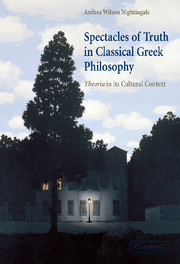Book contents
- Frontmatter
- Contents
- Acknowledgments
- Introduction
- 1 Theoria as a cultural practice
- 2 Inventing philosophic theoria
- 3 The fable of philosophy in Plato's Republic
- 4 Theorizing the beautiful body: from Plato to Philip of Opus
- 5 “Useless” knowledge: Aristotle's rethinking of theoria
- Epilogue: “Broken knowledge”? Theoria and wonder
- List of references
- Index of passages cited
- General index
Epilogue: “Broken knowledge”? Theoria and wonder
Published online by Cambridge University Press: 22 September 2009
- Frontmatter
- Contents
- Acknowledgments
- Introduction
- 1 Theoria as a cultural practice
- 2 Inventing philosophic theoria
- 3 The fable of philosophy in Plato's Republic
- 4 Theorizing the beautiful body: from Plato to Philip of Opus
- 5 “Useless” knowledge: Aristotle's rethinking of theoria
- Epilogue: “Broken knowledge”? Theoria and wonder
- List of references
- Index of passages cited
- General index
Summary
It is true that the contemplation of the creatures of God hath for its end … knowledge, but as to the nature of God, no knowledge, but wonder; which is nothing but knowledge broken off, or losing itself.
Francis BaconFor the clarity we are aiming at is indeed complete clarity. But this simply means that the philosophical problems should completely disappear. The real discovery is the one that makes me able to stop doing philosophy when I want to – the one that gives philosophy peace.
WittgensteinWonder is the foundation of all philosophy, inquiry its progress, ignorance its end. I'll go further: there is a certain strong and generous ignorance that concedes nothing to knowledge in honor and courage, an ignorance that requires no less knowledge to conceive it than does knowledge.
MontaigneWonder plays an essential role in the pursuit and practice of theoria, yet it is rarely analyzed in the scholarly literature. As Aristotle stated so memorably in the Metaphysics:
It is through wonder (ϑαυμάζειν) that men originally began, and still begin, to philosophize, wondering at first about obvious perplexities, and then … experiencing perplexity (διαπορήσαντες) about greater matters … Now the man who is perplexed and wonders (ʾαπορῶν καί ϑαυμάζων) thinks himself ignorant … therefore, if it was to escape (Φεύγειν) ignorance that men practiced philosophy, it is clear that they pursued knowledge for the sake of knowing, and not for the sake of anything useful.
(982b)- Type
- Chapter
- Information
- Spectacles of Truth in Classical Greek PhilosophyTheoria in its Cultural Context, pp. 253 - 268Publisher: Cambridge University PressPrint publication year: 2004

